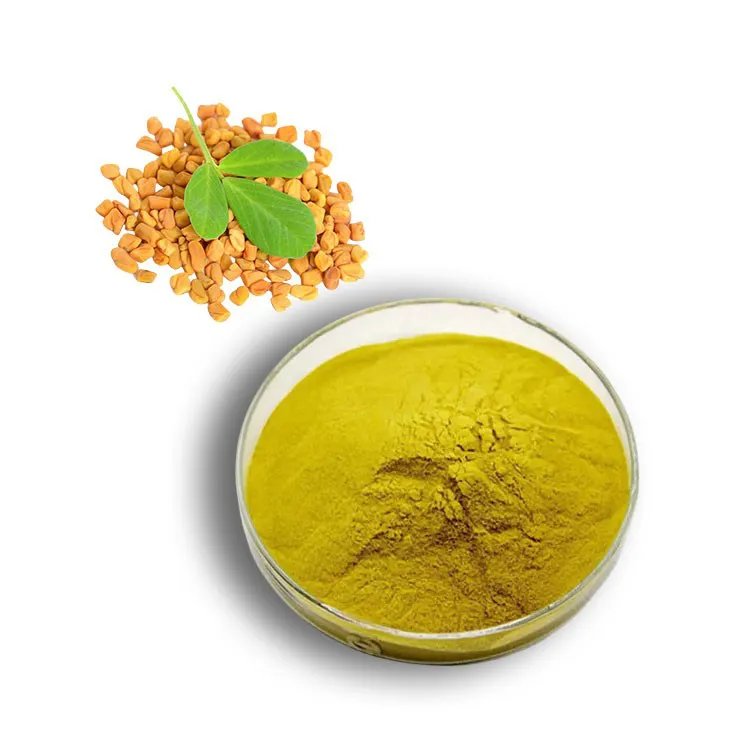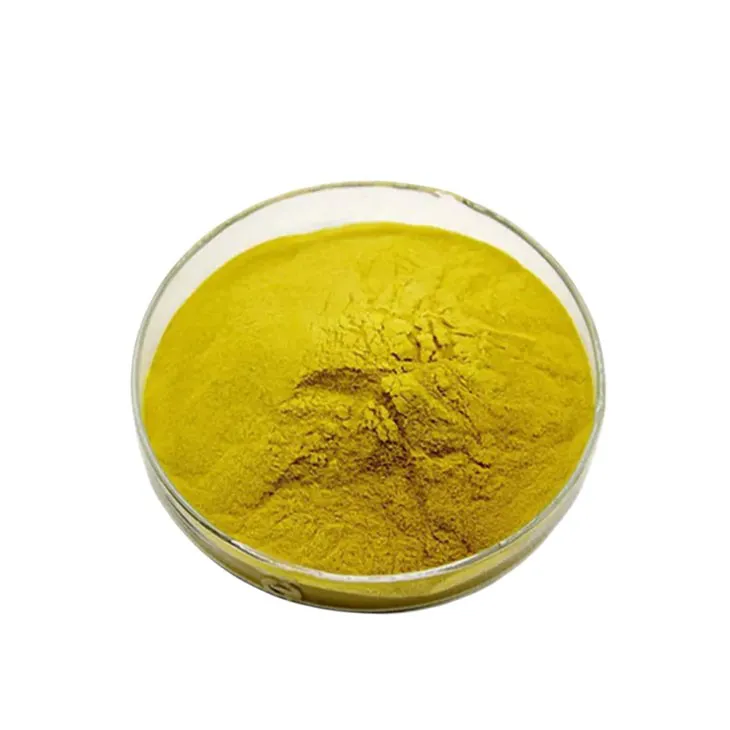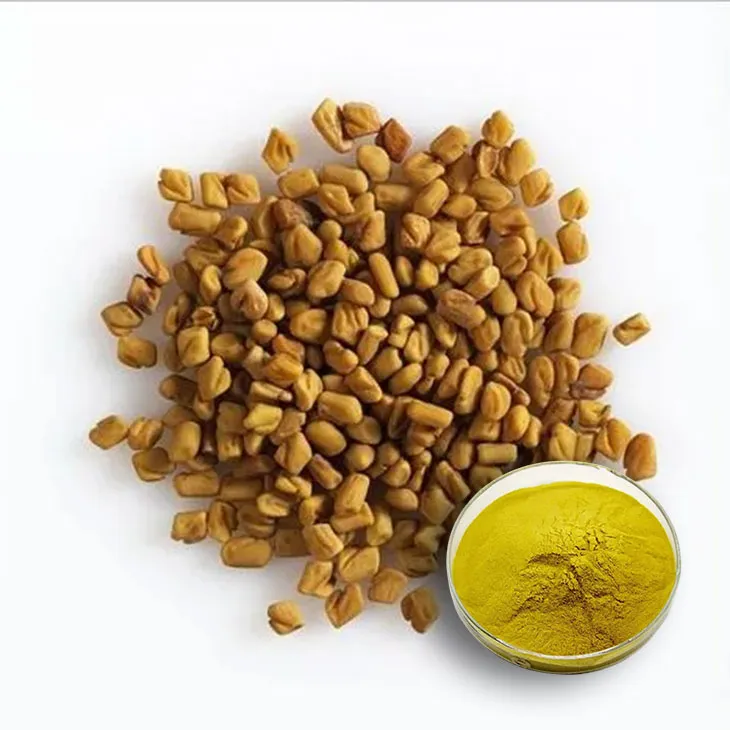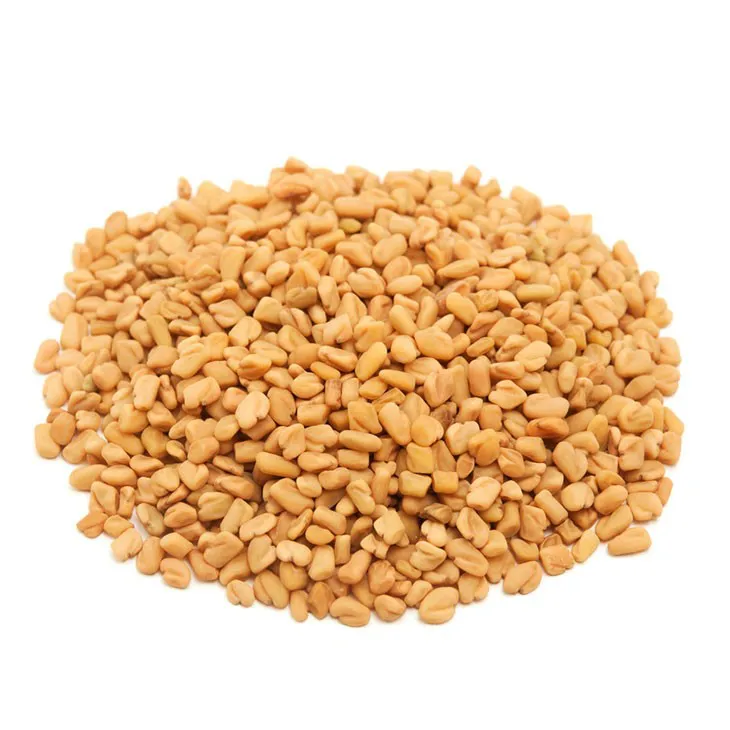- 0086-571-85302990
- sales@greenskybio.com
Fenugreek extract powder: components in fertilizers and feeds.
2024-12-01

1. Introduction
Fenugreek (Trigonella foenum - graecum) has been used for centuries in traditional medicine and cuisine. In recent years, its extract powder has gained attention in the fields of fertilizers and animal feeds. The unique properties of Fenugreek Extract Powder make it a valuable ingredient in these areas. It is rich in various bioactive components that can potentially have a positive impact on plant growth in fertilizers and the health and productivity of animals in feeds.

2. Fenugreek Extract Powder in Fertilizers
2.1 Organic Matter Source
Fenugreek Extract Powder serves as an excellent source of organic matter in fertilizers. Organic matter is crucial for soil health as it improves soil structure. It helps in binding soil particles together, creating larger aggregates. This, in turn, enhances soil porosity, allowing for better air and water movement within the soil. The improved soil structure due to the addition of fenugreek extract powder provides a more favorable environment for plant roots to grow and spread.
For example, in sandy soils that are often too loose and have poor water - holding capacity, the organic matter from fenugreek extract powder can increase the soil's ability to retain water. In clayey soils that are typically compacted and have poor drainage, it can help to loosen the soil and improve drainage.
2.2 Nutrient Availability
The extract powder also plays a role in improving nutrient availability for plants. It contains certain compounds that can interact with soil nutrients. For instance, it may contain organic acids that can chelate micronutrients such as iron, zinc, and manganese. Chelation helps to keep these nutrients in a soluble form, making them more accessible to plants.
Moreover, fenugreek extract powder can influence the soil microbial community. Soil microbes are essential for nutrient cycling. Some of the components in the extract powder can serve as a food source for beneficial soil microbes. These microbes can then break down organic matter and release nutrients in a form that plants can absorb. For example, bacteria can convert organic nitrogen into ammonium and then nitrate, which are the forms of nitrogen that plants can utilize.
2.3 Growth - Promoting Factors
There are several growth - promoting factors present in fenugreek extract powder. It may contain plant hormones or their precursors. For example, it could potentially contain auxins, which are hormones that play a key role in plant cell elongation and root development.
Another possible growth - promoting factor is the presence of certain amino acids. Amino acids are the building blocks of proteins, and plants need them for various physiological processes. Fenugreek extract powder may supply essential amino acids to plants, which can enhance their growth and development. Additionally, some of the bioactive compounds in the extract powder may stimulate the plant's natural defense mechanisms, making the plants more resistant to diseases and pests.

3. Composition of Fenugreek Extract Powder for Fertilizer Use
3.1 Macronutrients
Although fenugreek extract powder is not a major source of macronutrients like nitrogen, phosphorus, and potassium compared to traditional chemical fertilizers, it still contains some amounts of these elements. Nitrogen is an essential component of proteins and nucleic acids in plants. Fenugreek plants can accumulate a certain amount of nitrogen during their growth, and this nitrogen can be present in the extract powder.
Phosphorus is crucial for energy transfer in plants, as it is a part of ATP (adenosine triphosphate). The extract powder may contain phosphorus in organic forms that can be slowly released into the soil and taken up by plants. Potassium is involved in many physiological processes in plants, such as osmoregulation and enzyme activation. While the levels of potassium in fenugreek extract powder may not be as high as in potassium - rich fertilizers, it can still contribute to the overall potassium supply in the soil.
3.2 Micronutrients
Fenugreek extract powder is a rich source of micronutrients. As mentioned earlier, it can chelate micronutrients like iron, zinc, and manganese. Iron is necessary for chlorophyll synthesis, and a deficiency can lead to yellowing of leaves (chlorosis). Zinc is involved in enzyme function and protein synthesis in plants. Manganese is required for photosynthesis and antioxidant defense in plants.
In addition to these, the extract powder may also contain other micronutrients such as copper and boron. Copper is an essential cofactor for many enzymes in plants, and boron is important for cell wall formation and pollen germination.
3.3 Organic Compounds
The organic compounds in fenugreek extract powder are diverse. It contains a variety of carbohydrates, including polysaccharides. These polysaccharides can contribute to soil aggregation and water - holding capacity.
There are also phenolic compounds present in the extract powder. Phenolic compounds have antioxidant properties and can also play a role in plant - microbe interactions. Some phenolic compounds may act as allelochemicals, which can influence the growth of neighboring plants.
Furthermore, fenugreek extract powder contains lipids. Lipids can have a role in soil structure improvement and can also be a source of energy for soil microbes.

4. Fenugreek Extract Powder in Animal Feeds
4.1 Nutritional Profile Enhancement
In animal feeds, fenugreek extract powder can enhance the nutritional profile. It is a source of protein, which is essential for the growth and development of animals. The amino acids present in the extract powder can supplement the amino acid requirements of animals. For example, in poultry feed, the addition of fenugreek extract powder can provide essential amino acids like lysine and methionine, which are often limiting in traditional feed ingredients.
It also contains vitamins and minerals. Vitamins such as vitamin A, vitamin C, and some B - vitamins may be present in the extract powder. These vitamins play important roles in animal metabolism, immune function, and growth. Minerals like calcium, phosphorus, and iron in the fenugreek extract powder can contribute to the overall mineral balance in animal diets.
4.2 Antioxidant Properties
The antioxidant properties of fenugreek extract powder are beneficial for animals. Animals are constantly exposed to oxidative stress due to various factors such as environmental pollutants, feed contaminants, and normal metabolic processes. Antioxidants in the extract powder can neutralize free radicals, which are highly reactive molecules that can damage cells and tissues.
By reducing oxidative stress, fenugreek extract powder can improve the health and performance of animals. For example, in dairy cows, it may help to reduce the incidence of mastitis, which is often associated with oxidative stress. In pigs, it can improve meat quality by reducing lipid peroxidation, which can cause off - flavors and reduce the shelf - life of meat.
4.3 Immunomodulatory Properties
Fenugreek extract powder has immunomodulatory properties that can boost the immune system of animals. It can stimulate the production of immune cells such as lymphocytes and macrophages. These immune cells play a crucial role in defending the body against pathogens.
In aquaculture, for example, adding fenugreek extract powder to fish feed can enhance the fish's resistance to diseases. In poultry, it can improve the birds' ability to fight off viral and bacterial infections, reducing the need for antibiotics and promoting more sustainable farming practices.

5. Composition of Fenugreek Extract Powder for Feed Use
5.1 Protein and Amino Acids
The protein content in fenugreek extract powder varies depending on the extraction method and the quality of the fenugreek seeds used. However, it generally contains a significant amount of protein. The amino acid profile of the protein is also important. It contains essential amino acids like leucine, isoleucine, and valine, which are necessary for muscle building and growth in animals.
Non - essential amino acids such as alanine and glycine are also present. These amino acids can be used by animals for various metabolic processes, such as energy production and synthesis of non - protein nitrogen - containing compounds.
5.2 Vitamins
As mentioned earlier, fenugreek extract powder can contain vitamins. Vitamin A is important for vision, growth, and reproduction in animals. Vitamin C is an antioxidant that can also play a role in collagen synthesis. B - vitamins such as thiamine (B1), riboflavin (B2), and niacin (B3) are involved in energy metabolism in animals. The presence of these vitamins in the feed can help to meet the animals' vitamin requirements and improve their overall health and performance.
5.3 Minerals
The minerals in fenugreek extract powder are an important part of its composition for feed use. Calcium is essential for bone formation and muscle function in animals. Phosphorus works in conjunction with calcium and is also important for energy transfer. Iron is necessary for oxygen transport in the blood, and zinc is involved in many enzymatic reactions in the body. The presence of these minerals in the feed can help to prevent mineral deficiencies in animals.
5.4 Bioactive Compounds
There are several bioactive compounds in fenugreek extract powder that are relevant for animal feed. The phenolic compounds, which have antioxidant and anti - inflammatory properties, can benefit animals' health. Saponins are another group of bioactive compounds present in the extract powder. Saponins can have anti - parasitic and immunomodulatory effects in animals.
Some of the alkaloids in fenugreek may also play a role in animal health. For example, they may have an effect on the nervous system or on the regulation of certain physiological processes in animals.
6. Conclusion
Fenugreek extract powder has a wide range of components that make it valuable in both fertilizers and animal feeds. In fertilizers, it can improve soil structure, nutrient availability, and promote plant growth. In animal feeds, it can enhance the nutritional profile, provide antioxidant and immunomodulatory benefits.
However, further research is still needed to fully understand the optimal use of fenugreek extract powder in these applications. This includes studying the best extraction methods to maximize the beneficial components, determining the appropriate dosages for different plants and animals, and exploring possible synergistic effects with other ingredients in fertilizers and feeds.
FAQ:
What are the main components of fenugreek extract powder in fertilizers?
The fenugreek extract powder in fertilizers may contain various components. It is likely to have organic matter which can improve soil structure. It may also include growth - promoting factors such as certain plant hormones or micronutrients that enhance nutrient availability for plants. However, the exact composition can vary depending on the extraction method and the source of the fenugreek.
How does fenugreek extract powder in fertilizers improve soil structure?
The organic matter in fenugreek extract powder can act as a binding agent in the soil. It can increase soil aggregation, which helps in creating larger soil pores. This allows for better water infiltration and air circulation in the soil. Additionally, as the organic matter decomposes, it releases substances that can further modify the soil's physical properties, making it more conducive to plant growth.
What are the antioxidant properties of fenugreek extract powder in animal feed?
In animal feed, fenugreek extract powder may contain antioxidants such as flavonoids. These antioxidants can neutralize free radicals in the animals' bodies. Free radicals are produced during normal metabolic processes and can cause damage to cells. By neutralizing them, the antioxidants in fenugreek extract powder can help maintain the integrity of cells in the animals, potentially leading to better overall health and performance.
How does fenugreek extract powder enhance the nutritional profile of animal feed?
Fenugreek extract powder may contain essential nutrients like vitamins, minerals, and amino acids. It can also have bioactive compounds that can improve the digestibility of other feed components. For example, it may enhance the absorption of certain nutrients in the animal's digestive tract, thus contributing to a more balanced and complete nutritional profile in the feed.
What are the immunomodulatory effects of fenugreek extract powder in animal feed?
The immunomodulatory effects of fenugreek extract powder in animal feed may be due to the presence of certain compounds. These compounds can interact with the animals' immune systems. They may stimulate the production of immune cells or enhance the activity of the immune system's defense mechanisms. This can help the animals better resist diseases and infections.
Related literature
- Fenugreek: A Review of Its Botany, Phytochemistry, Pharmacology, and Nutritional Importance"
- "The Role of Fenugreek in Soil Fertility and Plant Growth"
- "Fenugreek Extract in Animal Nutrition: A Comprehensive Study"
- ▶ Hesperidin
- ▶ citrus bioflavonoids
- ▶ plant extract
- ▶ lycopene
- ▶ Diosmin
- ▶ Grape seed extract
- ▶ Sea buckthorn Juice Powder
- ▶ Beetroot powder
- ▶ Hops Extract
- ▶ Artichoke Extract
- ▶ Reishi mushroom extract
- ▶ Astaxanthin
- ▶ Green Tea Extract
- ▶ Curcumin Extract
- ▶ Horse Chestnut Extract
- ▶ Other Problems
- ▶ Boswellia Serrata Extract
- ▶ Resveratrol Extract
- ▶ Marigold Extract
- ▶ Grape Leaf Extract
- ▶ blog3
- ▶ blog4
- ▶ blog5
-
The best lemon juice powder in nature.
2024-12-01
-
Organic Vitamin K2 Powder Suppliers
2024-12-01
-
Bulk purchase of L - tyrosine.
2024-12-01
-
Vitamin K2 Manufacturers
2024-12-01
-
100% Pure Natural Rutin.
2024-12-01
-
Chinese Citrus Bioflavonoid Suppliers.
2024-12-01
-
Sea buckthorn oil
2024-12-01
-
Red Wine Extract
2024-12-01
-
Astaxanthin
2024-12-01
-
Curcumin
2024-12-01
-
Agaricus Blazei Extract
2024-12-01
-
Uridine-5'-monophosphate Disodium salt
2024-12-01
-
Lemon Extract
2024-12-01
-
Lotus leaf extract
2024-12-01
-
Mulberry Extract
2024-12-01
-
Honeysuckle Pollen
2024-12-01





















